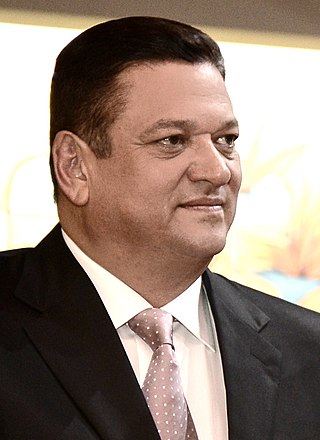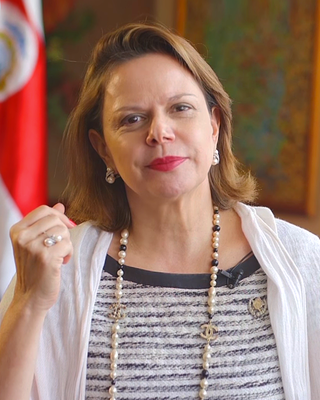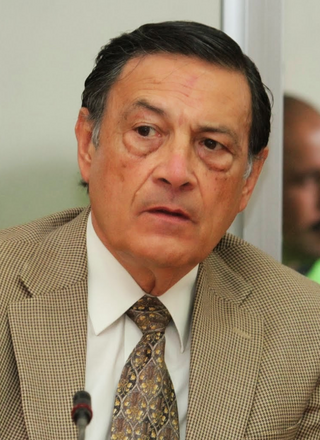| |||||
| Decades: | |||||
|---|---|---|---|---|---|
| See also: | |||||
Events in the year 2014 in Costa Rica .
| |||||
| Decades: | |||||
|---|---|---|---|---|---|
| See also: | |||||
Events in the year 2014 in Costa Rica .


The politics of Costa Rica take place in a framework of a presidential, representative democratic republic, with a multi-party system. Executive power is exercised by the president and their cabinet, and the President of Costa Rica is both the head of state and head of government. Legislative power is vested in the Legislative Assembly. The president and 57 Legislative Assembly deputies are elected for four-year terms. The judiciary operates independent of the executive and the legislature but remains involved in the political process. Costa Rica is a republic with a strong system of constitutional checks and balances. Voting is compulsory in Costa Rica but it is not enforced.

The National Liberation Party, nicknamed the verdiblancos, is a political party in Costa Rica. The party is a member of the Socialist International. Social-democratic by statute, the party has a few internal factions, including liberals, Third Way supporters, centrists, and social conservatives.
Mauricio Rodrigo Solís Mora is a Costa Rican former professional footballer who played as a defensive midfielder.

The Citizens' Action Party is a political party in Costa Rica.
Same-sex marriage has been legal in Costa Rica since May 26, 2020 as a result of a ruling by the Supreme Court of Justice. Costa Rica was the first country in Central America to recognize and perform same-sex marriages.

Johnny Francisco Araya Monge is a Costa Rican politician. He was the mayor of the country's capital San José from 1998 to 2001 and again since 2003. He was also the co-president of the United Cities and Local Governments (UCLG) from 2010 to 2013. He is a member of the National Liberation Party (PLN) and was presidential candidate in the 2014 election.

Epsy Alejandra Campbell Barr is a Costa Rican politician and economist who served as the Vice-president of Costa Rica from 8 May 2018 to 8 May 2022. She is the first woman of African descent to be vice president in Costa Rica and in Latin America.

General elections were held in Costa Rica on 7 February 2010. The ruling party before the election, the center-left National Liberation Party, put forward former Vice-President Laura Chinchilla as its presidential candidate, while the libertarian, Movimiento Libertario nominated former legislator Otto Guevara. Opinion polls before voting started consistently put Chinchilla as the front-runner, a trend confirmed in the election-night count, which showed her garnering 46.76% of the vote.
Events in the year 2013 in Costa Rica.

General elections were held in Costa Rica on Sunday, 2 February 2014 to elect a new president, two vice presidents, and 57 Legislative Assembly lawmakers. In accordance with Article 132 of the constitution, incumbent President Laura Chinchilla Miranda was ineligible to run for a second consecutive term.

Luis Guillermo Solís Rivera is a Costa Rican politician and educator who was the 47th President of Costa Rica from 2014 to 2018. He is a member of the Citizens' Action Party (PAC).

The Christian Democratic Alliance is a political party in the Cartago constituency of Costa Rica. It was founded in 2012, and is led by Mario Redondo Poveda, a former President of Congress and former member of the Social Christian Unity Party. In the general election of 2014, Redondo was elected to the only seat in the Legislative Assembly won by the ADC. Another party of the same name was founded in San José but did not participate in the election. According to its statutes the ADC intends to enrol at national level in the future.

The National Restoration Party is a political party in Costa Rica. It was founded in 2005 by Carlos Avendaño Calvo mostly by dissidents of Costa Rica's historical Christian party, Costa Rican Renewal, after its then only deputy, Carlos Avendaño Calvo, left. Avendaño would successfully return to Congress because of the party from 2010 to 2014. Even though he had personal differences with Justo Orozco, both were able to work together in defending the same agenda, mainly the conservative views of the evangelical community. The party's candidate in the presidential election of 2014 was Avendaño, who received 1.35 percent of the vote.

Ana Helena Chacón Echeverría is a Costa Rica politician, who served as the nation's 2nd Vice President, under Luis Guillermo Solís 2014–2018, and as Ambassador in Spain, under Carlos Alvarado. Her political career is dedicated to issues of feminism, human rights, and public health policy. Previously a cabinet minister and deputy, Chacón has also served on numerous committees and conferences on the national and international level.
Víctor Hugo Morales Zapata is a Costa Rican politician. He was a member of the Citizens' Action Party and the third deputy for San José for the 2014 to 2018 assembly. He resigned the party in 2017.
Trade unions in Costa Rica advocate for the rights of workers in Costa Rica. Dating back to the late 1800s, labor unions in the country have been a political force. They remain active in political and social life for many Costa Ricans.
Events in the year 2015 in Costa Rica.

Municipal elections were held in Costa Rica on Sunday, February 2, 2020, to elect all municipal offices in the country: mayors, aldermen, syndics, district councilors and the intendants of eight special autonomous districts, together with their respective alternates in all cases. These will be the fifth direct municipal elections since the amendment to the 1998 Municipal Code and the second to be held mid-term since the 2009 reform.

General elections were held in Costa Rica on 6 February 2022, to elect the president, two vice-presidents, and all 57 deputies of the Legislative Assembly. As none of the presidential nominees obtained at least 40% of the votes, a runoff was held on 3 April 2022, between the top two candidates, José María Figueres and Rodrigo Chaves Robles.
In the run up to the Costa Rican general election scheduled to take place in 2022, various organisations carry out opinion polling to gauge voting intention in the country. Results of such polls are displayed in this article. The date range for these opinion polls are from the previous general election, held in 2018, to the present day.